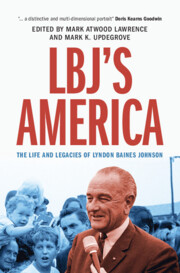7 results
4 - Post-miracle
-
- Book:
- Why the Ancient Greeks Matter
- Published online:
- 06 February 2025
- Print publication:
- 06 February 2025, pp 151-170
-
- Chapter
- Export citation
15 - LBJ, the Great Society, and Vietnam
- from Part II - Homefronts
-
-
- Book:
- The Cambridge History of the Vietnam War
- Published online:
- 02 January 2025
- Print publication:
- 28 November 2024, pp 321-342
-
- Chapter
- Export citation
7 - Incarceration and Confinement Literature
- from Part II - African American Genres
-
-
- Book:
- The Cambridge Companion to Contemporary African American Literature
- Published online:
- 14 December 2023
- Print publication:
- 21 December 2023, pp 128-146
-
- Chapter
- Export citation
10 - Social Justice and the American Essay
- from Part II - Voicing the American Experiment (1865–1945)
-
-
- Book:
- The Cambridge History of the American Essay
- Published online:
- 28 March 2024
- Print publication:
- 14 December 2023, pp 166-181
-
- Chapter
- Export citation

LBJ's America
- The Life and Legacies of Lyndon Baines Johnson
-
- Published online:
- 19 October 2023
- Print publication:
- 19 October 2023
Chapter 4 - The Great Society and the Beloved Community: Lyndon Johnson, Martin Luther King Jr., and the Partnership That Transformed a Nation
-
-
- Book:
- LBJ's America
- Published online:
- 19 October 2023
- Print publication:
- 19 October 2023, pp 94-119
-
- Chapter
- Export citation
2 - The Skepticism toward Moderation and What Its Critics Miss about It
- from PART II - WHAT KIND OF VIRTUE IS MODERATION?
-
- Book:
- Why Not Moderation?
- Published online:
- 12 October 2023
- Print publication:
- 12 October 2023, pp 37-45
-
- Chapter
- Export citation

